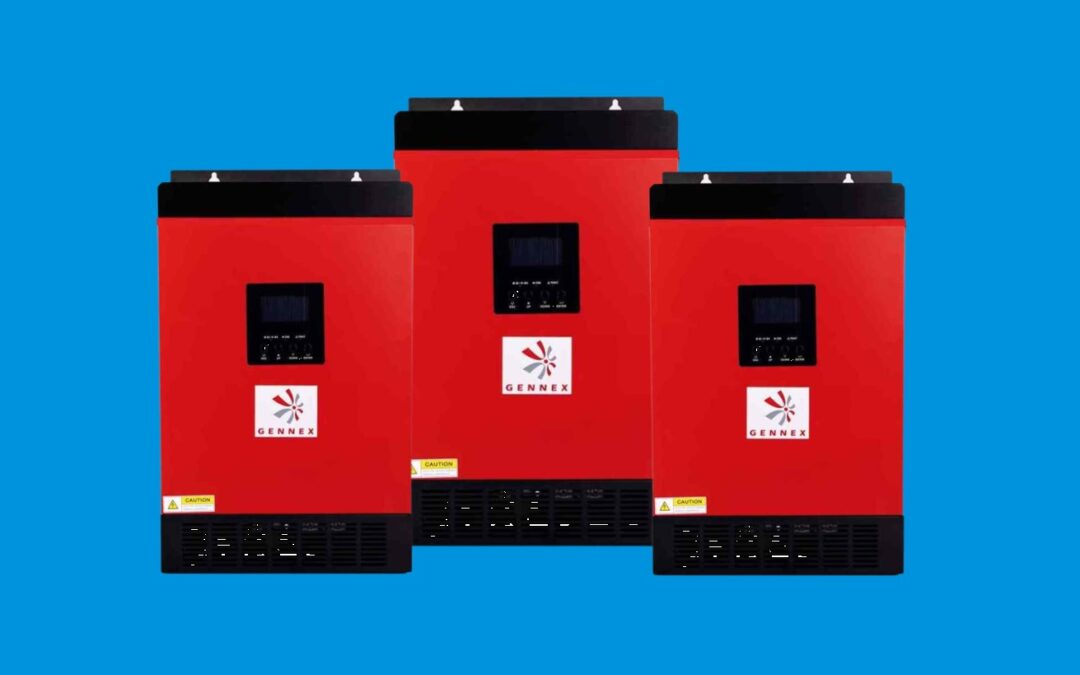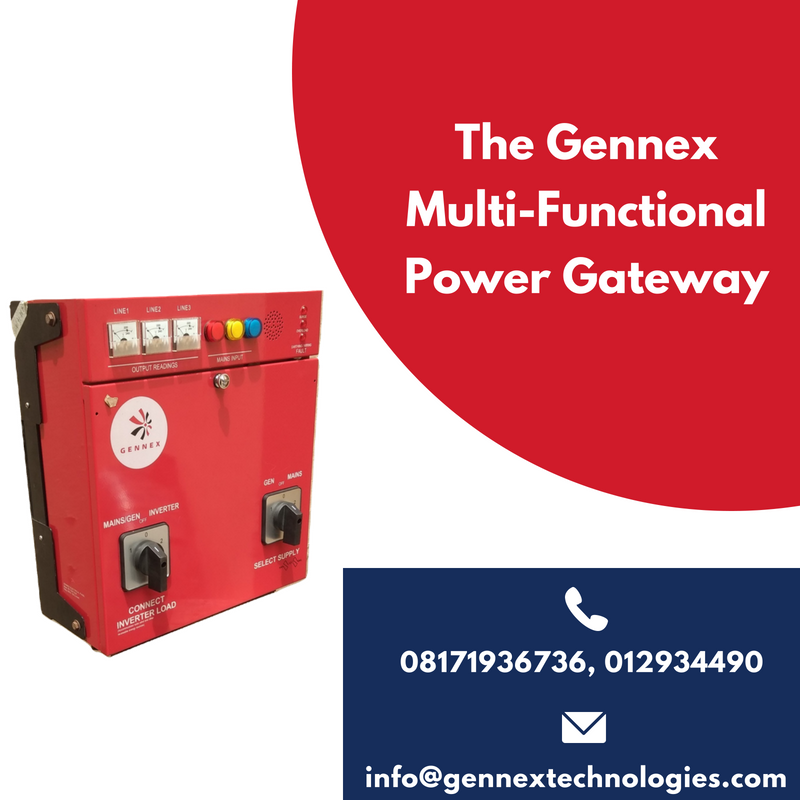There are a variety of solar inverter in Nigeria to choose from when considering buying an inverter for your solar energy solution. A solar inverter in the simplest of terms converts the output from your solar panels installed on your roof into usable electricity for your home or business.
The inverter’s primary function is to convert Direct Current (DC) provided by the solar panel into Alternating Current (AC) that can be used to run your appliances at home or office complex. Buying the right product for a particular solar application is very important to your solution and there are many factors to be considered before selecting the right solar inverter for yourself or your client. There are different types of inverters, each with different functionalities and properties. There is also the issue of choosing the right capacity of the inverter to use in Nigeria.
Key Factors to Consider While Choosing the Right Solar Inverter in Nigeria
In your search for the right solar inverter in Nigeria, you may want to consider the following in your shopping process.
1.) Solar Inverter Efficiency
Solar inverter efficiency means the ratio of output power to the input power under specified working conditions, which is expressed in percentages. The efficiency refers to how much DC power is converted to AC power for actual use. The right solar inverter can be very efficient, usually 85 – 90% or 95% depending on the inverter type and make. The solar inverter price in Nigeria can be affected also by their efficiency. Solar Inverter efficiency can never be up to 100% because some of the power can be lost between the dc and ac process and use.
Be that as it may, Inverter efficiency directly affects your solar system’s total energy production. The total electricity your solar panels create flows through the inverter whether you are using monocrystalline or Polychrystaline panels. A solar inverter with 80% efficiency means a loss of 20% of all the electricity generated by the system. But, If the efficiency of your inverter is 90% whether it is 2kva, 3kva, 5kva or 10kva, you will lose only 5% of your electricity. That is why it is important to pay attention to the inverter specification before buying.
2.) The Solar Inverter Type
When choosing inverters for your solar PV system installation or for your clients, you need to research the different types of inverters you want to use. Because a wrong choice can impact the performance of the solution. In this regard, you may want to choose from regular inverters or hybrid inverters.
The regular inverter in this sense are the commonly used inverters and are available in different sizes and capacities. On the other hand, a hybrid inverter is one of the latest innovations in the solar PV system globally. Hybrid inverters are made by combining two or more inverters’ functionalities to produce the most powerful device for solar solutions. They come with an in-built MPPT solar charge controller that you would have to buy separately if you are using a regular inverter, and some can function without the use of batteries. An example is the Gennex 5KVA/48V Axpert VMlll Hybrid Inverter that can supply your home/office with electricity without using your batteries.
3.) Inverter Warranty and Protection Measures
Warranty and protection measures are key factors to consider when choosing your solar inverter in Nigeria too. Inverters possess good warranties just like solar panels. Before you buy an inverter you are not familiar with, you may want to know the warranty and what it covers.
Similarly, the inbuilt protective measure of an inverter is a crucial factor for consideration during the buying process. Good inverters have output short-circuit protection, overcharging protection, over-temperature protection, etc.
4.) Power Rating and Voltage Compatibility:
Another key factor to also consider is the power rating of the inverter in relation to the solar panel capacity you want to use. Obviously, you cannot use a 670w solar panel with a 1kva inverter. Ensure the inverter’s capacity matches or slightly exceeds the total capacity of your solar panels.
Similarly, make sure to verify that the inverter’s input voltage range is compatible with your solar panel configuration. This will ensure that your solar system performs optimally.
Capacities of Solar Inverters in Nigeria
There are different capacities of solar inverters in Nigeria for your home or business solution installations. Below are some of the inverters you can get in Nigeria easily.
- 1KVA inverter
- 1.2KVA solar inverter
- 2kva inverter
- 3kva inverter
- 5kva inverter with parallel kit for an upgrade to up to 50kva installation
- 6kva Inverter with parallel kit for an upgrade
- 8kva Inverter with parallel kit for an upgrade
- 10kva inverter with parallel upgrade kit
Learn more about solar inverters with various capacities
Hybrid inverters with parallel kits like the one we sell makes it possible to install and upgrade your solar installation anytime you need more energy while keeping the first installation intact. With this kind of inverter, you can get an initial solution that powers only your essential appliances, and upgrade it anytime there is a need for more energy.
Solar Inverter Price in Nigeria
The prices of solar inverters vary according to their make and capacities. Below are prices for some of the best hybrid solar inverters we stock in Nigeria that come with in-built MPPT charge controllers.
- 1.2KVA/720W/12V Lobo Inverter = ₦ 68,500
- 2KVA/24V MKS PLUS with 1,500W MPPT Solar charge = ₦ 213,500
- 3kW/24V MKS PLUS with 1,500W MPPT charge controller = ₦ 339,000
- 3KVA Growatt = ₦ 348,500
- 5KW/48V VMII with 5,000W Inbuilt MPPT Charge Controller = ₦ 480,500
- 5kW/48V VMIII with 5,000W MPPT charge controller (Battery Independent & Inbuilt Bluetooth) = ₦ 496,500
- 5kW/48V MKS Zero With 4,000W Inbuilt MPPT (Zero Transfer Time with Parallel operation up to 9units) = ₦ 510,000
- 5kW/48V MKS PAR B With 4,000W Inbuilt MPPT and Parallel operation up to 9units = ₦ 484,000
- 5kW/48V MKSIII with 5,000W MPPT charge controller (Battery Independent, Inbuilt Bluetooth With parallel Operation up to 9units) = ₦ 506,000
- 5kW/48V KING With 4,000W Inbuilt MPPT and Parallel operation up to 9units and Inbuilt bluetooth With
Zero transfer time = ₦ 527,000 - 6kva Inverter (Axpert VM III Twin – 230 VAC) = ₦ 496,000
- 8KVA Inverter – Axpert MAX (230 VAC+ Built-in MPPT) = ₦ 901,000
- 10kW/48V 3P-IN/3P-OUT INFINI SOLAR with 14,850W MPPT charge controller (with Parallel Function) = ₦ 1,517,000
The above represents quality hybrid inverter prices in Nigeria. The prices can be different to a large degree based on the quality of the product and distributor or manufacturer. Be that as it may, the general prices of inverters in Nigeria can affect the kind of solution a user wants with regard to their financial capability. But if you want to enjoy your solution for a long time, you need to opt for quality inverters, solar panels and batteries instead of cheap models.
Are you wondering what kind of solution is right for you? Request a free quote to know the exact solution size you need.
Frequently Asked Questions About Solar Inverters
As stated earlier, a solar inverter is a device that converts the direct current (DC) electricity produced by solar panels into alternating current (AC) electricity that can be used by appliances and the grid. Solar inverters are essential for any solar panel system, as they make the power compatible and usable. Solar panel on the other hand help convert sunlight into electricity.
A solar hybrid inverter is a type of device that can convert and store solar energy for different purposes. It can work with both on-grid and off-grid solar systems, and it can provide backup power during grid outages. A solar hybrid inverter combines the functions of a solar inverter and a battery inverter in one unit, making it more efficient and versatile than standard inverters.
Yes, solar inverters can often be repaired, depending on the nature and extent of the issue. Repairing a solar inverter is generally more cost-effective than replacing the entire unit. If you have a faulty inverter, our team of engineers can help fix it for you.
Since solar inverter function by converting direct current (DC) from solar panels into alternating current (AC) that can be used by appliances or fed into the grid, therefore solar inverter cannot technically work without solar panels. Be that as it may, some inverter (Pure sine wave) can work without solar panels
MPPT stands for Maximum Power Point Tracking, and a solar inverter with MPPT technology is designed to optimize the efficiency of a solar power system by continuously adjusting the operating point of the solar panels for better performance. Solar inverter MPPT goal is to extract the maximum available power from the solar panels under varying environmental conditions, such as changes in sunlight intensity and temperature.




Comment * I need a solar inverter system that can power a two bedroom flat. A television, two fans, a mini fridge and 15 watt bulbs. I need to know the total cost of equipment plus installation.
Hi Steve
Kindly visit https://gennextechnologies.com/quotes/ and get the cost implication for the solution you want.
Thanks a lot
I have (2) 320watts solar panels,and (2) 180ah batteries, what size of inverter do I need.Thank you
Hi Bayo,
You need a 24V inverter. A 2kVA or a 3kVA hybrid inverter system would work, however, you would have to increase the units of solar panels so as to be able to optimally charge the batteries.
Kindly visit https://gennextechnologies.com/quotes/ for more
Thank you.
What are the materials needed to power a duplex of about 7 split units ac 1 standing ac 5 water heaters. 1 water pump 2tv, 1 fridge, freezer washing machine cooker oven let say 100. 6wtt bulbs,
Good day pls I need inverter that doesn’t use batteries that can power up to 40 to 50 kw loads
The location is a church camp.
Hello Eng. Fredrick
Thanks for your comment. A member of our team will get in touch with you via email soon.
You may also call or send us a WhatsApp message on any of our support lines: 012934490, 08171936361, 08179462854
I need a solar inverter system that can power a two bedroom apartment. A television, three split AC, fridge- freeze, washing machine and other. I need to know the total cost of equipment plus installation.
Hello Olujimi
Thanks for your comment. A member of our team will send you a quote via email.
You may also call or send us a WhatsApp message on any of our support lines: 012934490, 08171936361, 08179462854
What type of solar inverter do I need for 1 horse power AC a refrigerator, microwave electric ion and washing machine
How much do i consider
Including installation
Hello Charisma
Thanks for your comment. A member of our team will get in touch with you via email soon.
You may also call or send us a WhatsApp message on any of our support lines: 012934490, 08171936361, 08179462854
please i need a solar installation that can power two laptops, one ceiling fan, my bulb and a dj jack speaker for my one room
and how much would it cost me
Pls I need a panel solar and battery that could carry 2freezers and a oven…pls can I know the exact amount it will cost me urgently needed
What type of soler do I need for phones charging, that can work 24/7
Hello Mr Amos
You want to consider our small solar package that you can pay for over a 12 months period. See the details here: https://gennextechnologies.com/quotes/
Please how much is tone inverter 2.5kva 24v?
Hello Frank
We currently do not have 2.5kva Inverter in stock